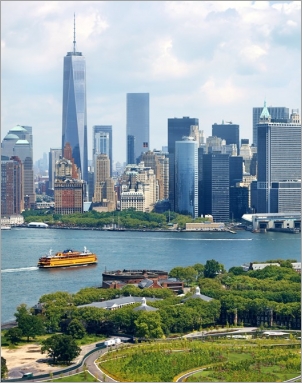Testimony of Eli Dvorkin
Editorial & Policy Director, Center for an Urban Future
Before the City Planning Commission:
Governors Island Zoning Amendment
February 3, 2021
Good morning.
I’m Eli Dvorkin, editorial and policy director of the Center for an Urban Future, an independent think tank focused on creating a more inclusive economy in New York City.
I am here to testify in support of the proposed Governors Island zoning amendment, which will help realize the island’s full potential as a vibrant, year-round resource for all New Yorkers.
This proposal builds on more than two decades of thoughtful planning around the island’s future and will generate new opportunities to address many of the city’s greatest needs.
Nearly a year into the pandemic, the role that parks and open space play as vital public infrastructure has never been clearer. This proposal will further expand the island’s parkland and open space, while serving as a catalyst to open the island’s unique natural environment to 24/7, year-round access.
This proposal also has the potential to create thousands of permanent jobs—no small thing for New York, given that the city ended the year with 560,000 fewer jobs than in December 2019. In addition to cultivating the conditions to spark job creation, Governors Island has integrated educational and workforce development opportunities and partnerships into the planning process long before shovels hit the ground. While these important initiatives will require a new level of support from city and state leaders, philanthropy, businesses, and educational institutions like the City University of New York and the New York City Department of Education to reach their fullest potential—as well as meaningful commitments from future tenants and vendors—the approach that Governors Island is taking can help ensure that the economic benefits that new development will bring will be shared widely with the community on the island and in neighborhoods across the city.
This proposal will also further strengthen the island’s key role as a hub for arts and culture: bringing new audiences to the island; supporting the development of new spaces to make and present cutting-edge work; and continuing to provide arts education opportunities that fill a major void left by the pandemic, which has taken a heavy toll on arts education funding.
And for a city still reeling from the near-total loss of its tourism sector to the pandemic—with devastating effects on thousands of accessible jobs in industries from restaurants and retail to ground transportation and accommodations—this proposal can help contribute to the rebound of this vital sector, while rooting the city’s future appeal in the principles of sustainable design and visitation.
Perhaps most important of all, this proposal aims to provide New York City with a leading global hub for interdisciplinary research on climate solutions. Building on the island’s core assets—from its unique geography to innovative educational institutions like the Harbor School to its status as a living incubator of exemplary landscape architecture—this proposal can help Governors Island serve as an even brighter beacon of environmental and economic sustainability in New York Harbor.
I am pleased to support this proposal and I encourage the Commission to do the same.


